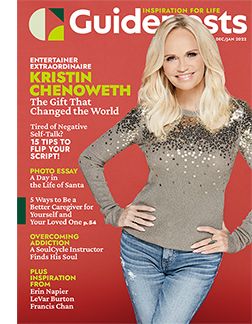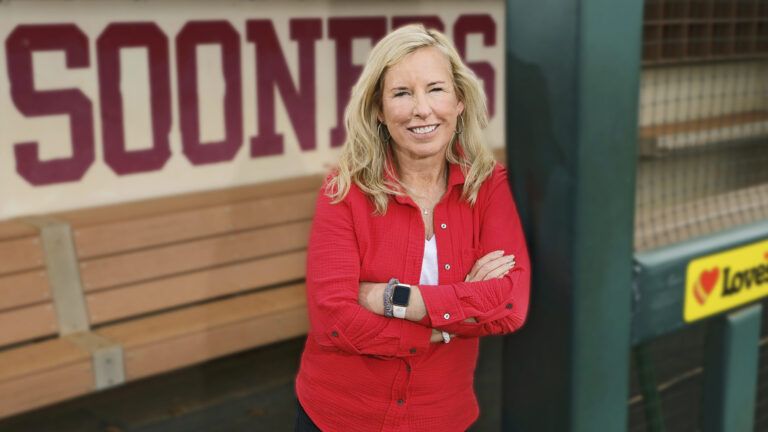Gloria Vanderbilt jeans.
The year I was 16, that’s all I wanted for Christmas. I dreamed of a gorgeously wrapped box waiting for me under the tree with the only present that mattered. Why? Well, I guess I was acting like a typical teenager, a little caught up in fashion and image.

January 2022 Guideposts
I imagined all the heads that would turn as I walked down the halls of my Broken Arrow, Oklahoma, high school in my sleek new Vanderbilts. I wasn’t a mean girl or anything. In fact, I was a pretty good kid. But something about those jeans got ahold of my imagination and wouldn’t let go. I had to have them!
Broken Arrow was a relatively small town back then, not far from Tulsa, the big city as far as we were concerned. I planned to be a singer, dancer and actor, a combination of Julie Andrews and Carol Burnett. I’d sung solos in church. Even sang the song “Four Feet Eleven” at a national church convention. The lyrics were meant for me: “I’m only four feet eleven, but I’m going to heaven….” My exact height (still is).
My parents wanted to make my older brother, Mark, and me happy, but they also knew what was best for us. Like when Mark had his heart set on a set of big tires for his truck one Christmas…and what did he get? Contacts. For his eyes. What a disappointment. Ah, contacts. It became a kind of joke between the two of us when something didn’t go our way.
That I ended up being raised by Mom and Dad was an extraordinary gift in itself, a blessing I thank God for every day of my life. I was adopted as an infant. My birth mom, who wasn’t prepared to raise a child, did the bravest and most generous thing by giving me up.
Mom happened to be in the same hospital, having just had a hysterectomy, with no hope of conceiving the daughter she and Dad wanted so badly. That she managed to connect with my birth mother, whose original plans of adoption had just fallen through, seemed like God’s will.
People sometimes say, “You must feel bad because you were adopted.”
“What do you mean?” I shoot back. I got the exact set of parents I was supposed to have.
Mom and Dad worked hard to give Mark and me all the wonderful things we had and the opportunity to do all the things we loved. I don’t think I could ever thank them enough. Every Christmas, there were the stockings Mom filled—and still does—with little necessities: a cool new toothbrush, hair ties, that silly razor I wanted, some hand sanitizer (these days). Our stockings were hand-knit with our names on top and jingle bells.
That’s why from the time I was a little girl I always wanted to give Mom the best gift at Christmas. Something perfect that would make her happy.
In the summers, I’d go out west to Hinton—even smaller than Broken Arrow—and stay with our grandparents for a couple weeks. They were real fixtures in town. Grandpa ran the barber shop, and Grandma ran the beauty salon, The Town Beauty Parlor. When I say ran, I mean they did everything. Grandma would cut, trim, dye, set the ladies’ hair. It was one of those places with big old sinks and a noisy pop machine in the corner. If you made an appointment, you’d best keep it. That’s the way it was in Hinton.
Grandma gave me little jobs. “You think you can go in the back and sweep?” she’d say. Of course, I could. Or Grandpa would slip me some change to buy candy at the drugstore. Grandma always had some vintage jewelry she sold at the front desk. One summer, I spotted a beautiful antique crystal brooch shaped like a peacock. Perfect for Mom. It grabbed hold of my imagination just the way those fancy jeans would later.
I took all the babysitting money I’d squirreled away and whatever Grandma paid me for sweeping the floors and bought it. Bingo. I was set for Christmas, kind of forgetting that I didn’t have any money left to buy something for Dad and Mark.
They understood. We all understood. It made Mom happy, that one big gift.
Like those Gloria Vanderbilt jeans I was hankering after a few years later. Don’t worry, I’m getting to that part.
Our high school didn’t have a big arts program back then, so the only way I could make my mark as a performer was dancing on the pom-pom squad. I was a Tigette, cheering on the Broken Arrow Tigers. Go, team! Our colors were black and gold. Maybe that’s why I wanted those jeans so badly. So I would stand out.
As soon as we put away the Thanksgiving turkey that year I was 16, we got out the Christmas decorations. We put carols on the stereo, made hot chocolate, set out the Advent calendar and the crèche and started counting down the days. Would it ever be the twenty-fifth?
I listened to carols, singing along, and watched all the TV specials (I still watch ’em): Rudolph the Red-Nosed Reindeer, A Charlie Brown Christmas. (No remote then—you had to get up and change the channels. Good exercise too.) Christmas Eve finally arrived. Dad read us the story from the Bible: “And in that region there were shepherds out in the field, keeping watch over their flock by night….” Jesus was coming, the light of the world.
After church on Christmas morning, we ate the breakfast you had to eat if you lived in Oklahoma: grits, sausage, eggs and toast. We opened our stockings, then finally settled down to hand out the big presents from under the tree. My box looked big, easily big enough for a pair of jeans, maybe two pairs. Could I be that lucky? I had butterflies in my stomach.
I untied the ribbon, carefully took off the paper (hearing in my head, even if Mom didn’t say it aloud, “Save the paper,” so it could be reused next year). Lifted the lid off the box. Only to see…what?
A Tigette letter jacket, black and gold with “Kristi” (that’s what I went by in those days!) stitched on the front and my graduation year on the sleeve.
Those butterflies in my stomach flew away real fast. Oh, I knew the jacket was a big deal: made to order and expensive. And we weren’t a rich family. Mom later told me how the company had insisted that the size was too small even for a super petite 16-year-old; she must have it wrong. No, Mom insisted, she really is four foot eleven. (Still am—did I mention that?)
I knew it was something I’d need to have later in the year. Getting your letter jacket is a big high school moment, right up there with getting your class ring. But for a Christmas present? When I was totally expecting those Gloria Vanderbilt jeans? Really?
“Wow, thanks so much,” I said, trying to hide my disappointment. Ah, contacts, the phrase flew through my head. I put on the jacket. A perfect fit. I knew that you should never refuse a gift. You had to receive it, to honor the givers, my dear parents who’d given me so much. I felt guilty and grateful all at once.
I thought of that brooch that had made Mom so happy, and me so happy and excited to give it to her. This was not the gift I expected, the gift that I wanted, the fancy designer jeans I wanted everybody to see me in. Yet suddenly…
Out of the corner of my eye, I saw our crèche and God’s son asleep in the manger. He too had the perfect adoptive parents of sorts, whom God had entrusted him to, Mary and Joseph, standing over him. At once something happened inside me, disappointment becoming transformed and transforming me in the process.
Jesus wasn’t the Messiah—the gift—that many people expected. Not that king who would reign from a palace, the powerful figure Herod feared would lead mighty armies with his sword.
He was but an infant born to a mere carpenter and his teenage bride from the tiny town of Nazareth, a poor speck on the map in Galilee. A humble couple who traveled by donkey to Bethlehem, lodging in a stable because there was no room for people like them at the inn—I could hear Dad read the words—wrapping their baby in swaddling clothes and laying him in a manger. A manger, where animals ate, for his earthly throne. Nothing could have been more unexpected.
And who was it who first came to worship him? Shepherds, the lowliest in that world’s pecking order, bringing their sheep, guided by angels who appeared to them in the heavens. The light of the universe did come, a child who would indeed grow up to change the world but through love and compassion and understanding and a sacrificial death that defied all expectations.
On that first Christmas, Jesus entered our world in so humble a way that no one could have imagined it. Yet he was the gift all mankind needed.
I grew up that Christmas when I was 16. I learned that what is given in love should be accepted with love. How proud I was wearing that jacket on campus; how I treasured it over the years. After the career I’ve had—beyond my expectations—I gave it to the Broken Arrow Performing Arts Center, which has honored it and me by displaying it in a glass cabinet for all to see, worn by the Tigette who went on to bigger stages and wider screens.
Ever since that Christmas, I’ve tried to look at what seem like disappointments differently. Sometimes you don’t get what you want. Sometimes what you get is even better. A blessing, in fact. A disappointment can be the way you are shown the direction you are meant to go in, not necessarily the one you want. Sometimes disappointments morph into miracles.
Recently I had the pleasure of recording my new album, Happiness Is… Christmas, with songs that remind us of the greatest miracle. Some are playful, like one we put together to mark that 16-year-old’s disappointment, “Santa, I’ve Got a Bone to Pick With You.” Another tells of teenage Mary’s journey, “Along the Little Road to Bethlehem,” and a Hanukkah song by Stephen Schwartz (who wrote the music and lyrics for Wicked) shows how the darkness can be vanquished: “We Are Lights.”
“You are the light of the world,” Jesus said. We are.
I like to be back in Broken Arrow—like me, it’s grown up a lot—for Christmas to be with Mom and Dad, see the old crèche and the stockings Mom knit for us, but it’s not always possible. Performances, recording gigs, TV shows, film schedules don’t always allow it. In that case, Mom and Dad join me where I am. On the road, in New York, in Los Angeles. Wherever we can celebrate. That we’re together is what’s most important.
Without fail, Dad brings his Bible with him, and even if it’s offstage, with a group of actors and crew members gathered around on Christmas Eve, he reads those ancient words: “And in that region there were shepherds out in the field, keeping watch over their flock by night….”
The gift that changed the world.
Kristin Chenoweth’s new album Happiness Is…Christmas is available wherever music is sold.
For more inspiring stories, subscribe to Guideposts magazine.







